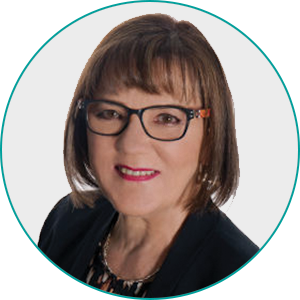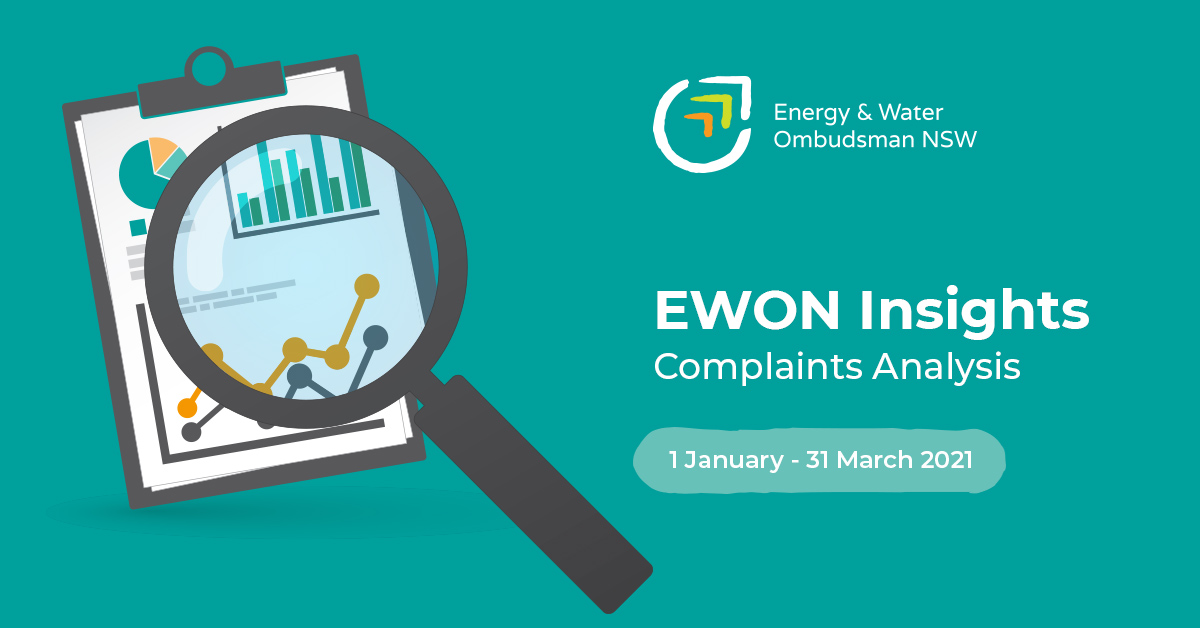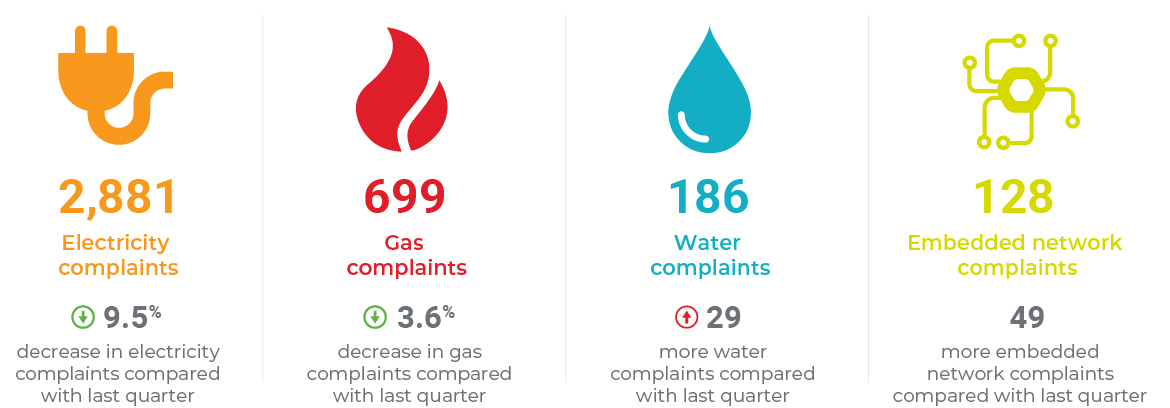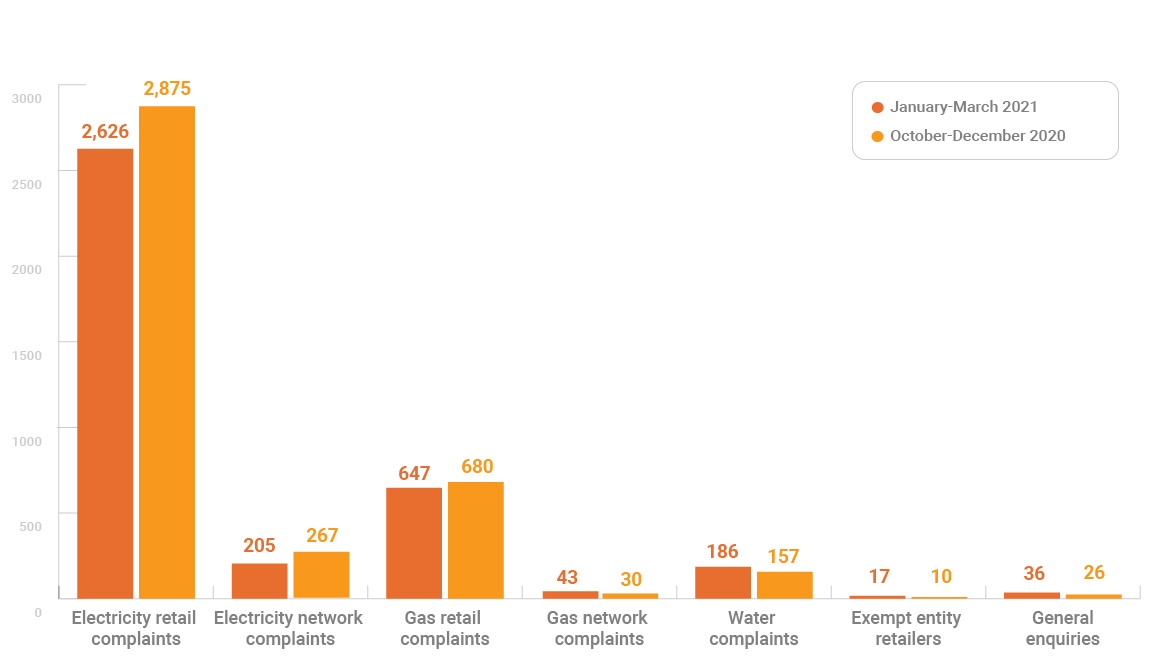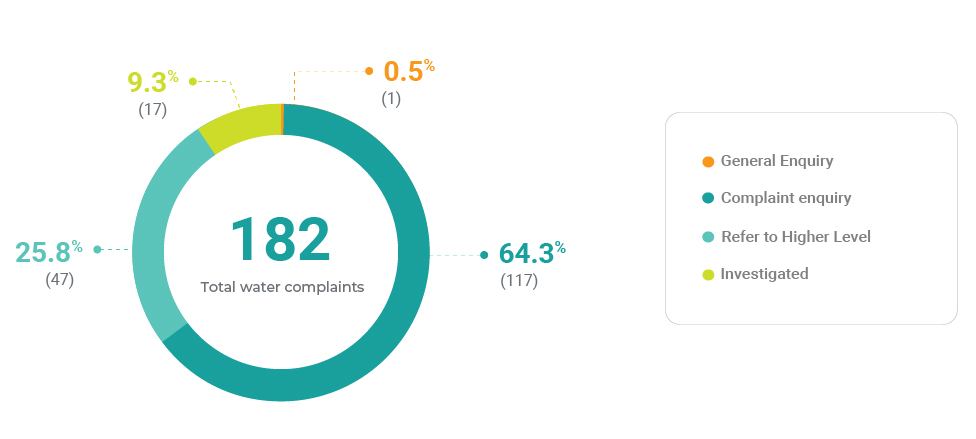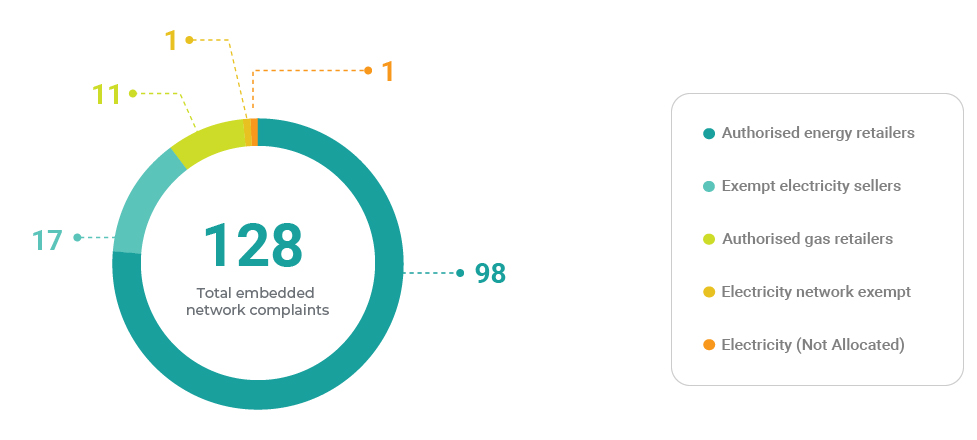The breakdown of all energy complaints by complaint category is shown in the pie chart and table below.
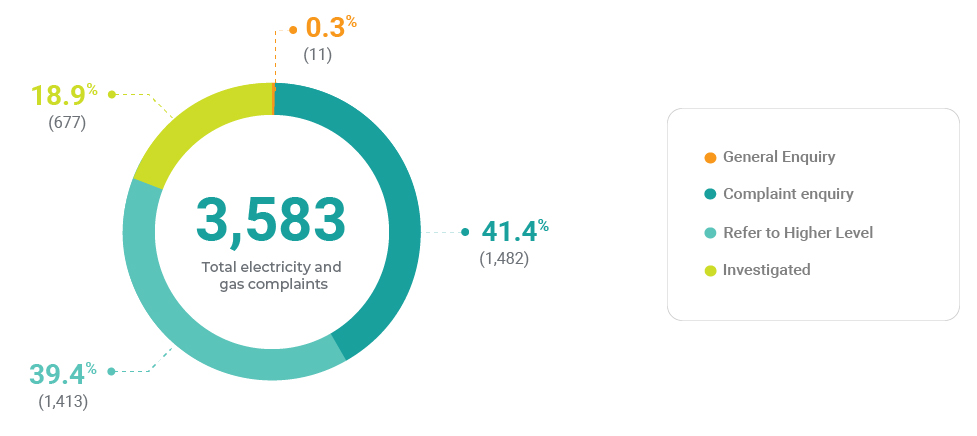
Table 4 – Energy complaints breakdown Jan-Mar 2021
| Complaint type |
Number of complaints |
% total energy complaints |
| General enquiry |
11 |
0.3% |
| Complaint enquiry |
1,482 |
41.4% |
| Refer to higher level |
1,413 |
39.4% |
| Investigated |
677 |
18.9% |
| Total |
3,583 |
100% |
Complaints associated with deceased estates
EWON first highlighted complaints about deceased estates in our EWON Insights report in the first quarter of 2018. We noted that finalising the affairs of a deceased family member is stressful. When closing energy and water accounts is managed effectively and with empathy, distress and anxiety decreases. We do not receive high numbers of complaints about this issue, but when we do, the impacts on the deceased customer’s family are significant.
Some EWON members have now joined the Australian Death Notification Service (ADNS) a collaboration of Births, Deaths and Marriages registries across Australia. Launched in 2020, it enables people to notify government and non-government agencies, organisations, and institutions that someone has died by way of a single contact. A wide range of organisations have joined the ADNS, covering services including banking, superannuation, phone and internet, energy and water, and government services.
We encourage all our members to engage with this service to improve the experience of those who are managing the death of a friend or family member.
The ADNS can be accessed at deathnotification.gov.au.
Case studies
Multiple contacts, poor service and failure to act increased a daughter’s grief and stress
An advocate contacted her late mother’s retailer to close the electricity and gas accounts. A month later she called again to check if the accounts had been closed. The retailer told her it had not received or processed a request to close the accounts but would backdate the closure date and waive the additional fees. Ten days later she received an email confirming the gas account was closed, but she did not hear about the electricity account. After a further follow-up call, she complained to EWON that she’d had no update on the electricity account.
EWON referred the matter to the retailer for resolution at a higher level and told the advocate she could return to EWON if an agreed outcome could not be reached. She returned to EWON as the complaint remained unresolved. She had contacted the retailer five times, yet the account remained open which was increasing her distress and grief.
EWON contacted the retailer to confirm the status of the customer’s electricity and gas accounts. They said both accounts had finally been closed and final bills sent. The retailer also said the electricity account had been reversed and rebilled in error after the first final bill was issued. Advice from EWON that both of her mother’s energy accounts had finally closed was appreciated by the advocate.
Backbilling
Under the National Energy Retail Rules, retailers have the right to recover undercharges. These Rules also provide protection for customers. Where the cause of the undercharge is not the customer’s fault, retailers are only allowed to backbill for nine-months and must offer customers a payment arrangement spread over the same timeframe i.e. a bill for six months unbilled consumption can be paid off over a six month period. EWON regularly receives complaints about backbilling including instances where a retailer has billed beyond the nine-month limit.
Case studies
Customer concerns resolved when undercharging provisions applied
After experiencing issues with his retailer about billing errors and online account service problems, a customer contacted EWON. The customer received a bill in December 2020 for $2,110 with outstanding charges of $1,259 and current charges of $850. There were no details about how the $1,259 had been calculated or what period it was for, and the retailer required immediate payment.
The customer had sent several emails to the retailer about the bill but had not received any response that explained the billing. The complaint was referred to the retailer for resolution at a higher level, but the customer recontacted EWON because the retailer had, in response to the RHL, promised an itemised bill which the customer did not receive. The customer wanted EWON to check the billing to ensure it complied with backbilling regulations and requested that he was offered a reasonable time to pay.
In response to EWON’s investigation, the retailer provided an itemised bill. It waived the arrears for the period of January to June 2020 as was required by the backbilling provisions of the rules, leaving only $829 owing. The customer was satisfied with this outcome.
Customer receives large backbill for three years’ consumption
A retailer issued a backbill of $16,270 covering a three year period, March 2017 to March 2020, that was disputed by the customer’s advocate.
The advocate told EWON that after an investigation, the retailer had accepted responsibility for an error where the wiring for the solar installation and smart meter had been set up incorrectly. The retailer said it had reconciled the billing and the amount owing for the past three years was $16,270. The advocate did not consider the amount owing to be reasonable when the retailer had accepted responsibility for the error and had not provided sufficient time to pay the backbill.
EWON referred this complaint back to the retailer at a higher level for resolution, however the advocate returned to EWON for an investigation as she was not satisfied with the response.
When EWON began its investigation, the retailer immediately applied a credit of $10,052 to the account covering the period from March 2017 to September 2019. This left a balance of $6,217. EWON’s investigation established:
- the consumption data from March 2017 to September 2019 was not estimated in accordance with the Rules because the estimated consumption was substantially higher than the customers actual consumption before March 2017 and after September 2019
- the retailer was not applying a feed-in tariff for all electricity that was recorded as being exported to the network, for the period of June 2019 to March 2020
- the back-billing provisions were not correctly applied and the customer was overcharged by $2,603.
The complaint was resolved when the account was re-billed after the retailer appropriately applied credits to comply with backbilling regulations. It applied an additional $800 credit and a pay on time discount of $297 which reduced the balance to $2,398. The retailer also established a payment plan of $399 per month for six months to pay the amount owing.
Move-in disconnections
Over the last year, disconnections for unpaid bills have been restricted by the AER’s Statement of Expectations. However, retailers have appropriately been able to disconnect a site if energy was being consumed without an established account. In most instances when this occurs, EWON encourages the customer to open an account with the retailer which ‘owns’ the site. There are however some circumstances where EWON will open an investigation into the disconnection.
Case Studies
Customer disconnected for not opening a gas account
A customer’s gas supply was disconnected as he had not established an account. The customer told EWON he did not realise there was a gas hot water system. He contacted the retailer and was told there was an outstanding amount of $468. It said it could raise a same-day reconnection order for a fee of $200 but if he did not want to pay this fee then the reconnection would take up to five business days. The customer said he could not afford the fee.
EWON contacted the retailer who advised a reconnection order had not been raised as the customer had not agreed to open an account in his name. EWON recontacted the customer and explained his responsibility to open an account. The customer opened an account and EWON assisted in organising a same-day reconnection. The retailer waived the reconnection fee and reduced the arrears to $191 in recognition of the customer’s financial situation. EWON also referred the customer to a community organisation for Energy Accounts Payment Assistance and financial counselling.
Customer disconnected due to confusion over which retailer owned the site
The customer moved into his new unit in October 2020 and requested energy accounts through a connection service. Direct debits were being deducted from his accounts and he assumed this was for both electricity and gas, however, he returned home in March 2021 to find the electricity had been disconnected.
The customer contacted who he thought was his electricity retailer and was told it did not have an account in his name. He checked the mailbox and found a letter from a retailer advising it had disconnected the site as no account had been established. He signed up with that retailer but was told reconnection could take up to two days. He was also concerned that the retailer intended to bill him from July 2020.
EWON contacted the retailer and confirmed that it had issued the relevant warning notice prior to disconnection. EWON also confirmed that there had been a failed transfer attempt by another retailer in November 2020. The customer was reconnected the day after the disconnection and the retailer agreed to only bill from the October 2020 move in date. The customer was satisfied with this outcome.
Transfer in error
The rules for resolving disputes about transfer errors are clear – the retailer who receives the initial complaint is responsible for resolving the customer’s dispute – even if that retailer was not responsible for the initial error. The following case study illustrates how some customers are still failing to resolve disputes about transfer in error, particularly when there is a breakdown in communication between the two energy retailers.
Case studies
Retailer transfer in error
A customer received a letter from Retailer A advising she was at risk of disconnection. The customer told EWON she had opened an account with Retailer B but was told that her account had transferred to Retailer A eight months ago. She complained to EWON that she had never contacted retailer A and the electricity bill it had sent her was higher than the charges she usually received from Retailer B.
EWON contacted Retailer A to stop the disconnection and find out how the transfer had occurred. Retailer A told EWON it had signed up another customer using an incorrect address. When it realised the error, Retailer A had cancelled the new customer’s contract but had not cancelled the transfer request for the incorrect address. This resulted in the customer’s account being transferred in error. Retailer A requested a retrospective transfer back to Retailer B and cancelled all invoices raised on the account.
EWON was then contacted again by Retailer A advising that the retrospective transfer request had been cancelled because Retailer B declined the request. Retailer B objected to the transfer and disputed that they were the previous Financially Responsible Market Participant (FRMP) for the customer’s address. Retailer A offered to waive all the charges on the account and allow the customer to open a new account with Retailer B instead. The customer agreed to contact Retailer B directly and open a new account.
